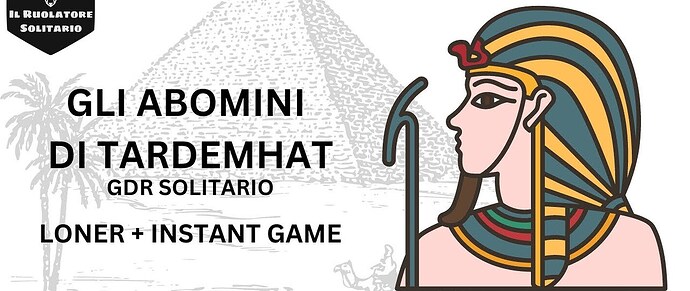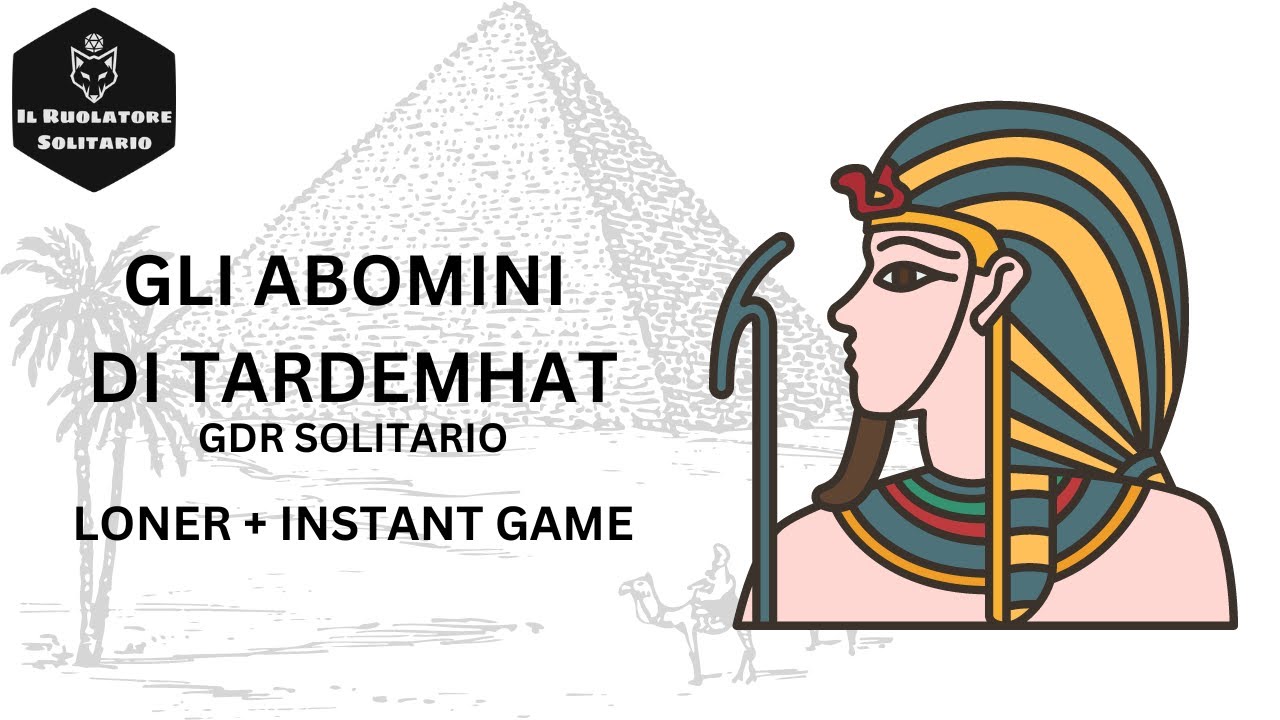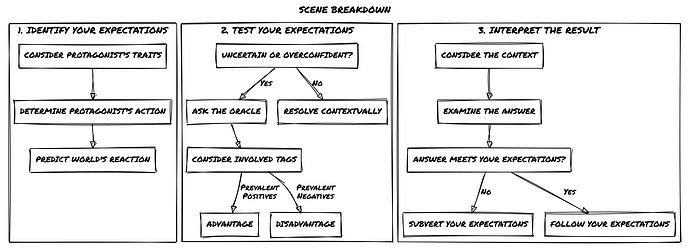Premise
This Actual Play is a written abridgment of a game which can be viewed in its entirety here (Italian language).
Use Loner’s rulebook in intermediate version 1.5. The game has since made it to v.2.3 and been released.
Loner is a Freeform Universal hack that adds some useful traits to generate conflict and fiction and completely throws away any kind of meta-currency.
Preparation
I used the Instant Game tables to generate an “instant setting”, rolling once on the setting table, once on the tone, and twice on “stuff”
- a 4 Ancient Egypt [this is really interesting!]
- tone: 45 heroic
- two things 45 limbo and 19 elected officer
Then roll an adventure seed:
- 12 a loner gone crazy
- two actions and two things: 9 build,54 mutations; 2 to warn, 32 to guide
I therefore establish that the game will take place in a weird pulp Ancient Egypt (like Gods of Egypt or the Scorpion King).
The “loner gone mad” will be the threat, which I determine is a witch who is conspiring to create crocodile-human hybrids
I then print out a list of randomly generated Egyptian-flavored names and roll those of the antagonist and NPC.
- The witch is called Hennutawi
- The pharaoh is Nikaure
- The protagonist is Wennefer
Character creation
Loner is a tag-based game based on descriptions of qualitative descriptors.
Characters in loner are generated like this: they have
- a concept: scribe
- two skills: man of the court and expert in magic
- a weakness:
- two pieces of equipment: tablet and stylus, a sickle
- goal: to get back into the good graces of the pharaoh
- motivation: social prestige
- nemesis: chief of scribes
Preamble
Fifteen years ago the priests of Amun exiled Hennutawi, a noble of the Pharaonic court who was dabbling in black magic, an affront to their deities. Therefore they decided that she should be exiled to the deepest desert and never return to civilization. It had been assumed that he had met his death in the sands of the desert.
A few days ago an incident occurred at the city market: while the city market was coming alive and everyone was busy trading and buying, suddenly a strange creature that looks like a man but with the head of a crocodile he killed six people in this heinous act before being cut down by the pharaoh’s guards.
The strange hybrid creature was considered an abomination because it mimics the appearance of the deities and it did not immediately appear to the priests who were questioned on the scene that it could be a divine manifestation. Indeed they recognized in the creature the signature of someone who had already attempted this hybridization experiment before being stopped, the witch Hennutawi and therefore concerned anxious priests begged the Pharaoh to do something to stop the impending catastrophe.
Without any delay he sent a whole garrison of his soldiers to search for the witch in the desert and the battalion never returned.
At this point the pharaoh remembers that among his scribes there is one who is a connoisseur of the occult even if he has never crossed the line like Hennutawi. Wennefer had tried the path of the priesthood but the order had rejected him and therefore he had decided to become a scribe.
But this propensity for black magic and a somewhat difficult character made it right away
lose away from the good graces of the pharaoh and had made him disliked by the chief scribe also thanks to the contribution of Penisola who is the chief scribe.
Now, however, his knowledge makes him useful and the Farone summons him with the mission of stopping Hennutawi and guaranteeing him unlimited resources for the purpose.
Beginning of the adventure
At this point I don’t know which way to turn and I ask the open oracle, which gives me back a random pair of verb (action) and noun (object). Shot on table D66:
12 continues
45 stanza
I understand that Wennefer continues to seek information at the palace the first thing that comes to Wennefer’s mind is to address the high priest of Amun, therefore, strengthened by the powers guaranteed by the pharaoh, he goes to the high priest (I casually draw the name Dejhuty)
From the conversation with Dejhuty, Wennefer comes up with the advice to consult the library of the temple (I roll again on the oracle of inspirations and the pair “pursue knowledge” comes out).
The scribe sets to work and I ask the oracle that the search is successful.
Wennefer has the advantage of occult knowledge, so I roll two “chance” dice and only one “risk” dice: 6 and 5, 1 respectively. A flat Yes.
He manages to find the volume he was looking for so evidently a copy of the same papyrus describing a chilling ritual “how to unite the divine with the man and thus unite the sacred beasts with human beings”
After five days of study (roll 1d6 to determine it) it is clear how Hennutawi has accomplished his sacrilege but still doesn’t know where to find it.
I question the oracle: “can the book give some indication the book can give some indication on where does this ritual take place?”
Roll with advantage (occult knowledge and high chance that the volume contains the information): 6 and 6; 4 “Yes, and…”
The papyrus describes the ritual in great detail: it can only be performed in certain places and the closest to the desert that Wennefer knows is the oasis of Tardemhat.
Strengthened by this knowledge of hers, Wennefer asks the pharaoh to guarantee him a small garrison and go immediately to the Oasis. He also knows who the ritual is, it can only be carried out in certain times phases of the moon so he has the hope of catching the witch in a moment of rest.
I ask the oracle: crossing the desert does the garrison encounter a difficulty that can stop them?
Shot with disadvantage (the desert is merciless): No.
I need inspiration because the dry answer risks blocking me: “expand obscene trade”. Interpretation: while they are going to the Oasis the garrison crosses a caravan it is now evening and therefore as a custom among the people of the Desert it is safer for the caravan and the garrison to camp together for greater security especially against any storms that can strike while they are sleeping better to be more in order to be able to intervene.
During dinner Whenever discovers that the caravan is carrying beautiful women destined, however, to the brothels of the capital Thebes. This attracts him and shocks him at the same time. In particular, he is very attracted to a young woman named Nebettawi. He is so in love with her that he begins to think that he could redeem her if he can fulfill a mission and get back into Pharaoh’s good graces and thus have status again
I ask the oracle: is Nebettawi also in love with Wennefer?
Shot with disadvantage (assuming bad faith on the slave’s part): “Yes, and…”.
Interpretation: Not only does Nebettawi reciprocate Wennefer, but she would be happy to be redeemed.
The two exchange sweet words, it is love at first sight in all respects!
Wennefer agrees with the caravan leader, asking for a right of first refusal on Nebettawi, which is granted to him on condition that he returns to the capital within three days, otherwise he considers the agreement void.
At this point Wennefer has every intention of speeding things up and decides the next morning, immediately taking leave of the caravan and his beloved, to march by force to the Oasis.
I question the oracle: Does this cause fatigue in the garrison? “Yes”
The garrison is tired, but they manage to force the march and at dusk the following evening they reach the Oasis in a situation of tactical disadvantage. If they camped outside the oasis they might be surprised by the witch or her creatures if she has any others.
If instead they decided to attack with the cover of darkness they would clearly have the advantage of both the environmental situation and the surprise but they would not have great visibility on what happens.
I ask the oracle: “Is the moon in the sky?” “No”. New moon, only starlight.
Wennefer decides not to delay any longer and attacks the inhabitants of the cursed oasis head-on, eager as he is to return to Thebes and redeem Nebettawi.
He and the soldiers enter the oasis and at this point I ask the oracle an open question: “What is the situation in the oasis?” Answer “belong to the case”. So a chaotic situation.
They enter the oasis and unexpectedly find themselves faced with a scene they would not expect: in the center of the Oasis the witch is consummating an act of passion with three (roll 1d6) of her creatures and is very busy in the embrace.
At this point Wennefer decides not to linger and to attack them by surprise.
I decided for a quick conflict resolution, asking the question directly to the oracle. I have the advantage of surprise and distraction from opponents and the disadvantage of tiredness and darkness. They cancel each other out so the roll is neutral.
Question: “Can they catch them by surprise, attack them and kill Hennutawi before he notices anything?”
Result: Double 6. I add a 1 to the Twists counter and the answer is “Yes, but…”
They attack and kill all the creatures and Wennefer manages to kill Hennutawi, but unbeknownst to them a fourth creature was nearby.
As soon as he sees the slaughter of his mistress and her companions and “attacks Wennefer directly?” “No, but…” he attacks one of the soldiers and “kills him?” “Yes, and…” attacks Wennefer, who shoots out his sickle and he speaks in front of the monster and sticks it to it.
At this point I use Loner’s “tactical” combat rules where each response deals damage to the character or opponent.
After a brief fight to the skin of his ears Wennefer kills the monster and silence falls on the oasis.
Wennefer cuts off the witch’s head and tells the soldiers to burn the bodies of the witch and the Creatures to burn anything they find, any belongings of the witch, and otherwise to rest overnight in the oasis.
“Does the night flow peacefully in the haunted oasis?” “No” during the night then unbeknownst to all, a fifth creature appears to attack them. “Can they fend it off before it does any damage?” “Yes”, they do.
The next morning finally after killing the last creature Wennefer and the garrison resume the way to the capital.
“Can they cross the desert and return in time, that is, in two days?”
“Yes”, they make it and go back to the capital.
They return victorious to Thebes, are covered with honors and Wennefer manages to redeem his beloved!
Conclusion
I absolutely did not expect this outcome, I actually believed that the desert would put a spanner in the group’s wheels and that another adventure would arise spontaneously to find and redeem the beautiful Nebettawi.
Instead the dice decreed another ending.
In conclusion of this actual play, I want to underline that I have absolutely nothing prepared for this play. It all emerged from random rolls on tables and from the interrogation and interpretation of the Oracle.
This solo play example is to illustrate my favorite game mode, i.e. without the use of diary rules, gamebooks or prepared forms.


